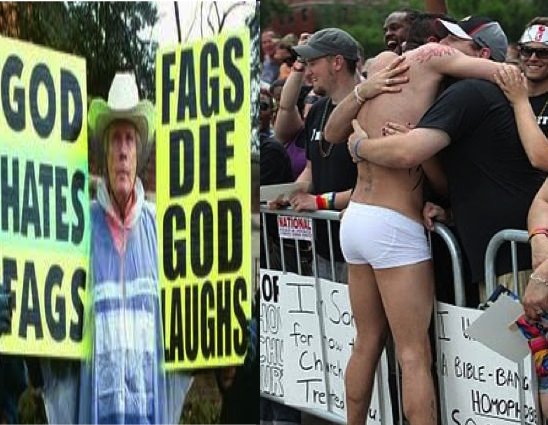In a recent post I asked you to ask me anything you were wondering. You can see it here. So far there are 12 questions, with a few others I’ve complied from previous posts. From here on out I am going to start chipping away at them once a week. The first question was asked by Dave Foreman:
How you approach the hatred of “ex-gays” by many in the GLBT community? I certainly don’t buy into much of what those kind of ministries sell, but I DO buy into the right of the individual to investigate whatever avenues of help they so choose. I went through such counseling. Understand, I no longer consider myself gay, or ex-gay. Certainly not “straight.” I ran across the term “Spouseosexual” which seems to most fit me. Problem is, everyone (both sides) want clear-cut labels. Life’s not that simple. Anyway, your comments would be greatly appreciated.
Again, much love to you.
Dave
Thanks for your question Dave. Here you go:
When it comes to “change”, that could take on many forms: from the traditional understanding of behavior modification all the way to emotional or relational or spiritual or psycho-social means of general mental health. The problem with this back-and-forth surrounding gay Christians/GLBT community vs. ex-gay occurs because of the human need for clear-cut labeling—such is the life of living here on earth. Socially constructed boxes by majority cultures placing them upon minority cultures got us here in the first place. And that is the bulk of what I am trying to do through my work, deconstruct those labels and replace them with a biblical context of a validated faith, life and journey.
There is a very real, and very clear hatred of ex-gays by many in the GLBT community. And yes, I do believe that hatred is the right word! I have experienced a distain like few other things in this life than the hatred of ex-gay people and its movement coming from gays and lesbians. From a socio-political standpoint, and even from a wide variety of GLBT individuals that I know, they look at ex-gay people as fakes, sell-outs, liars, and as weak people who just want to conform to cultural norms. I can’t tell you how many times I have heard from gay folks that “there is no such thing as an ex-gay!” My approach then, is to understand and work off of their paradigm of engagement, and then try to work towards a more wholistic understanding of free will and change to diffuse a lot of the name-calling and invalidation; which I see as the root of the problem, and therefore, your question.
I was told once by an ex-gay person: “It’s not free will unless you have the ability to go in the other direction.” So true! This person was coming from a traditional understanding of a sexual ethic, and used this sentence to argue for the right to be an ex-gay (or to even pursue that as a valid option) despite what many in the gay community think and feel. But what I said back to this person was: “I totally agree, it’s not free will unless you have the ability to go in the other direction. But wouldn’t that, then, also apply for a gay Christian? It’s free will, and gay Christians also have the right to be gay Christians. Therefore just as you don’t want to be invalidated in your ability to move in another direction; don’t invalidate someone else’s journey just the same. And the more you do, the more this argument and personally hurt feelings will never cease.”
There is a HUGE invalidation pandemic running rapid in the culture war between the Church and the gay community. Each side is trying their darndest to prove their way is the overarching generalizable means of living; and they advocate for their way by saying the other group is an impossibility. But that is not a true statement, no matter how you look at it. If there is even one person, in any direction, that claims to be a certain way, than that is truth to their belief and journey no matter how many on the “other side” want to disprove it.
The root of truth in this situation says, If only one says they have overcome their same-sex attractions and are straight, or that only one says they believe in Jesus Christ as their Lord and savior and have a same-sex attraction and are GLBT, or that only one says I’m not gay, but I’m sure not straight, or only one says they have a same-sex attraction but choose to be married to a person of the opposite sex; than that is not only their truth, but also the true existence that such a person does exist and should be validated for that existence whether you/someone agrees or disagrees.
I have found that explanation, one that consists of a logical argument of change and free will, has worked quite well in helping folks have a broader understanding of knowing their own journey in relation to others—and how that effects not only their place in the culture war, but individual relationships as well.
What do you all think of this argument and my explanation?
Much love.











